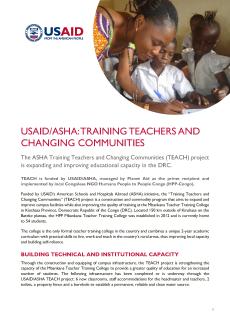The ASHA Training Teachers and Changing Communities (TEACH) project is expanding and improving educational capacity in the DRC.
TEACH is funded by USAID/ASHA, managed by Planet Aid as the prime recipient and implemented by local Congolese NGO Humana People to People Congo (HPP-Congo).
Funded by USAID’s American Schools and Hospitals Abroad (ASHA) initiative, the “Training Teachers and Changing Communities” (TEACH) project is a construction and commodity program that aims to expand and improve campus facilities while also improving the quality of training at the Mbankana Teacher Training College in Kinshasa Province, Democratic Republic of the Congo (DRC). Located 150 km outside of Kinshasa on the Bateke plateau, the HPP Mbankana Teacher Training College was established in 2012 and is currently home to 54 students.
The college is the only formal teacher training college in the country and combines a unique 2-year academic curriculum with practical skills to live, work and teach in the country’s rural areas, thus improving local capacity and building self-reliance.
BUILDING TECHNICAL AND INSTITUTIONAL CAPACITY
Through the construction and equipping of campus infrastructure, the TEACH project is strengthening the capacity of the Mbankana Teacher Training College to provide a greater quality of education for an increased number of students. The following infrastructure has been completed or is underway through the USAID/ASHA TEACH project: 6 new classrooms, staff accommodations for the headmaster and teachers, 2 toilets, a property fence and a borehole to establish a permanent, reliable and clean water source.
The construction launch was commemorated in May 2022 with the participation of USAID/DRC Education Office Director, Ezra Simon, members of USAID/DRC’s education, environment and gender teams, and the provincial representative from the Ministry of Education, along with the area’s Traditional Chief. Construction is expected to be completed by September 2022.
BUILDING AWARENESS AND STRENGTHENING DIPLOMACY
Through ASHA’s public diplomacy component, TEACH is also working through academic courses and community events to build knowledge of American democratic values, politics, culture, and learning. To date, TEACH has designed and implemented courses on democracy, US history, the civil rights movement, gender equity and girls’ education. Weekly all-school meetings with teachers and students expand on these topics and encourage student (especially female) leadership, democratic participation and freedom of speech. TEACH also collaborates with community and government leaders in celebrations including International Women’s Day and World AID’s Day, and service events in which students visit local communities to understand the realities and challenges of teaching and the day-to-day life throughout the DRC. Students engage with communities on topics of gender, health and environmental resilience. TEACH is also building English language skills through weekly English classes for all students.
LOOKING FORWARD
With the completion of construction, the capacity of the Mbankana teacher training college will increase from 54 to 90 students annually (45 per class), nearly doubling the number of teachers formally trained in DRC yearly and deepening its impact. This long-term investment, alongside ongoing courses, English lessons and community events, is a physical testament to US generosity and long-term investment towards improved education in DRC.
For more information on the USAID ASHA initiative and the Planet Aid TEACH project, please see:
ASHA: https://www.usaid.gov/work-usaid/business-funding/grant-programs/americ…
Planet Aid: https://www.planetaid.org/countries/democratic-republic-of-congo
Planet Aid's mission is to inform, mobilize and inspire individuals and communities to work together to bring about worldwide environmental and social progress. Planet Aid,
Inc. is registered in the US as a 501(c)(3) nonprofit organization. In the US, Planet Aid’s collection of used clothes helps reduce waste, promote reuse, and saves landfills. Approximately 10 million people in the U.S. support this mission by donating 50,000 tons of used clothes and shoes annually, avoiding an estimated 300,000 tons of CO2 emission. Abroad, the funds generated from the US-based clothing collection support locally-led development projects in education, health, agriculture, climate action and community development.

